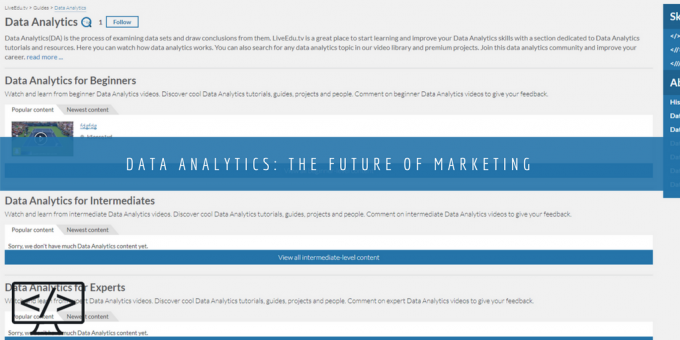 With the huge amount of data being generated every second, it is obvious for companies to move to a more analytical method of understanding their business. As of 2017, companies regularly capture a lot of customer data. This information is vital and can be used to build a successful business. However, many current marketers lack the required skill to make proper use of the data available.
With the huge amount of data being generated every second, it is obvious for companies to move to a more analytical method of understanding their business. As of 2017, companies regularly capture a lot of customer data. This information is vital and can be used to build a successful business. However, many current marketers lack the required skill to make proper use of the data available.
Some of the premium projects that are streamed on LiveEdu are aimed at entry-level marketers, so that they can learn the skills required to advance their career. We understand the needs of the current marketers and learners who are interested in the field, and that’s why you can find relevant premium projects regarding the subject.
Dev_Zero from Minneapolis, US, is working on Python Data Analytics and Visualization, a Data Analytics project that takes the learner through the steps of creating a complete operational analytics dashboard. If you are eager about learning Data Analytics or Python in general, you should check out the project.

Evolving Market
The market is evolving, and the methods used to understand it are also changing rapidly. With data storage and cloud computing becoming cheaper, companies are more inclined towards storing every single bit of information and later using it to help make marketing decisions.
Relevant data can be anything from a customer’s email to their demographics. The data is invaluable in many ways. For example, the company can run A/B testing on their email campaigns to know what works best. All of this is now powered by cloud storage, automation, and tools that facilitate the collection, understanding, and processing of data.
So, how will Data Analytics impact the future of marketing? Let’s discuss some key points below.
1. Data Analytics can help uncover valuable opportunities
Data is everywhere. But, that doesn’t mean it is useful from the offset. As we already know, the human brain is not capable of making sense of a vast amount of data. To compensate our inability to comprehend and make sense of the data, tools and techniques are employed. Information, when generated from data, reveals patterns which can then help further uncover valuable opportunities. Data Analytics is where all the magic happens. However, companies should try to follow a systematic approach, rather than randomly try to uncover huge amounts of data in the hope of finding something new. The approach should be to find a problem to solve and then proceed from there.
When things are done correctly, companies will find patterns that can help them understand both their customers as well as their employees. From there, they can unlock new opportunities and deploy them accordingly which in return impacts the future of the company and how it evolves.
2. Crunching data fast and simple.
With the exponential growth in the data being generated, it is no surprise that companies are moving towards “algorithmic marketing.” This approach makes a huge amount of data processing viable, and also offers a “self-learning” process capable of creating more meaningful interactions with customers.
The technologies used to make it a reality are natural language processing, predictive statistics and machine learning. Amazon is the prime example, using all of these technologies to refine their business. With a proper setup of customer-behavior learning, their system understands what the customers need, and recommends them the product(s) which they are most likely to buy next. Everything is automated, enabling Amazon to maximize profits as more data flows in. In future, more and more companies will move towards the same approach, automating major parts of their data crunching process and only providing a simple dashboard for marketers to make decisions from.
3. Understanding the consumer decision journey
With an array of devices, the consumer’s decision journey to buy a product or a service has changed drastically. Consumers are now more inclined to use different sources, tools and technologies to make a decision. So, what does that mean for companies? With the previously level playing field completely changed, it is now paramount to understand their decision habits and then try to use the knowledge to get new customers and also ensure that existing customers don’t move to a competitor product.
Digital marketing plays a crucial role in understanding the decision journey of a consumer. Companies have to invest in building a proper website and using the available technologies such as SEO to reach potential customers. Understanding what the online consumer searches while making a purchase decision can drastically improve the sale figures. Digital analytics and personalization can open doors and improve sales by over 10 percent. In short, Data Analytics plays a crucial role in understanding the wide range of customers and can then be used in refining the digital marketing campaign.
Also read, How Artificial Intelligence Will Impact Customer Service and Meet Nir Eyal, An Author, Entrepreneur and Angle Investor From New York City.
Conclusion
Almost every aspect of a business can be directly or indirectly connected with Data Analytics. Opportunities are there, however, how they choose to use it depends on the company. For marketers, there is no option but to learn Data Analytics and use it in their work. The best way to start is to learn the basics from our Learn page and then move to the premium projects that offer real-world skills.
So, what do you think about Data Analytics and its impact on the future of marketing? Comment below and let us know.







